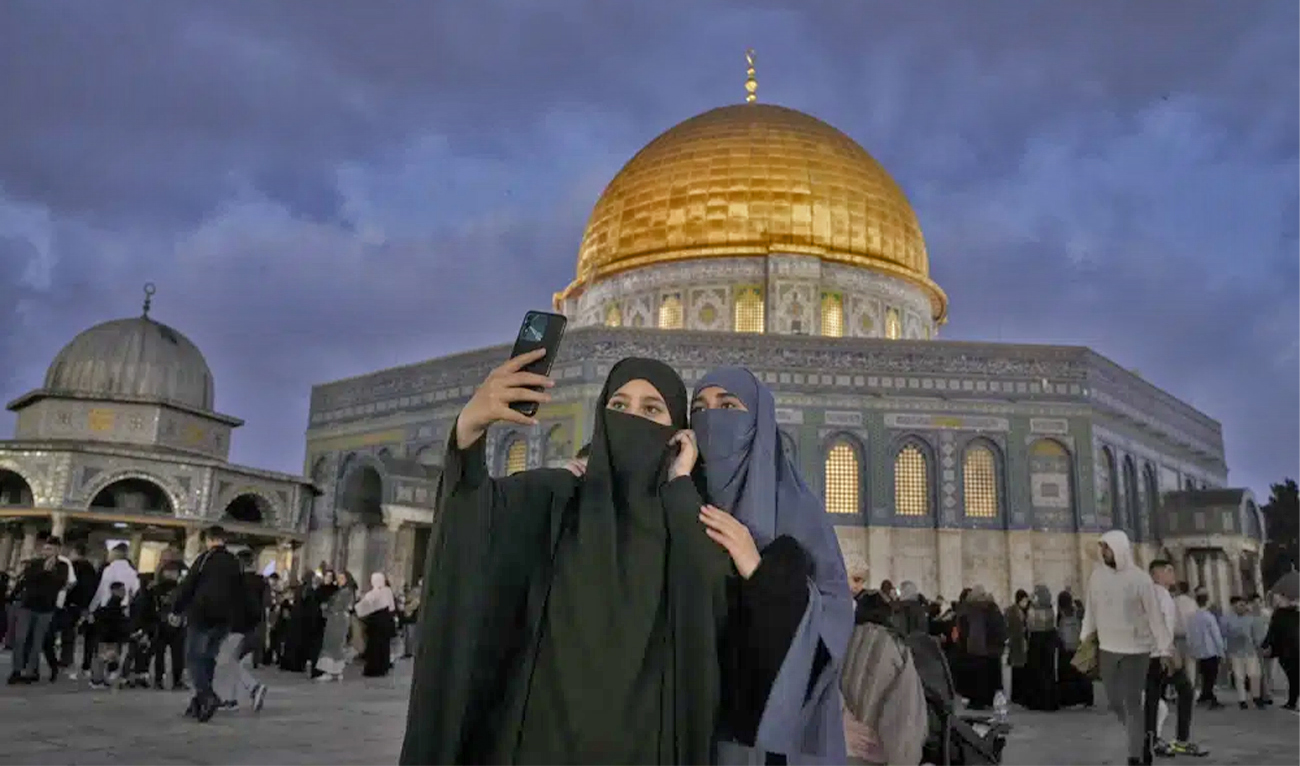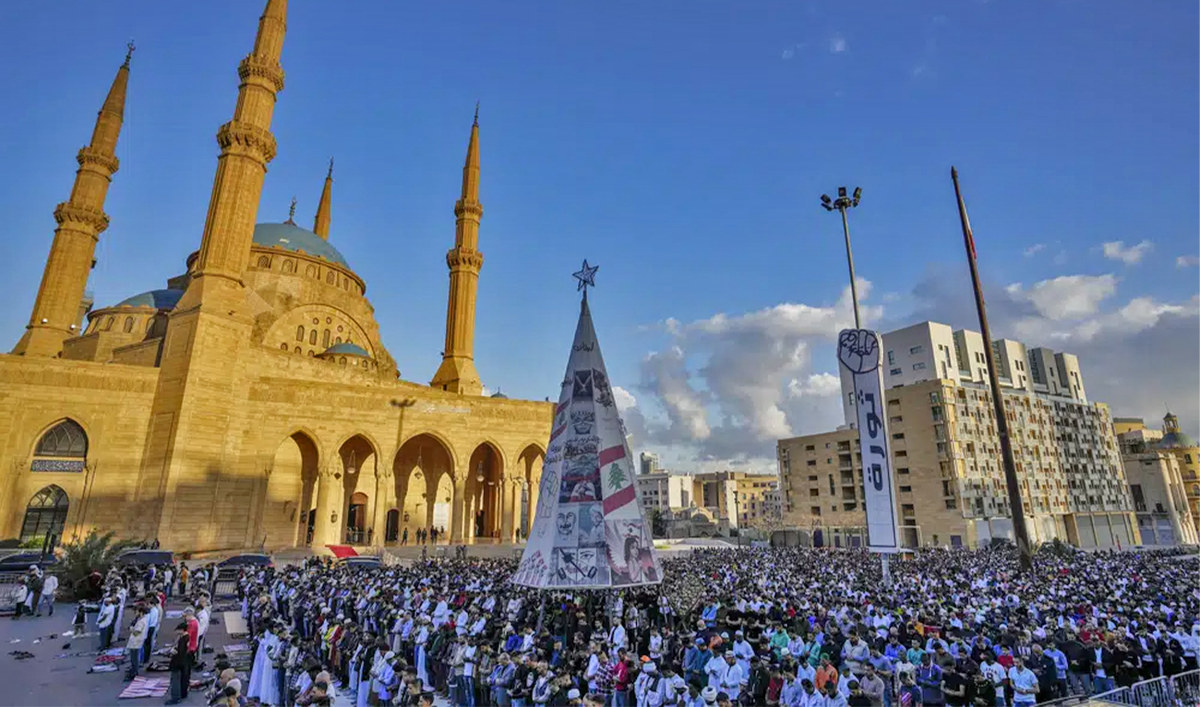BEIRUT: The holiday of Eid Al-Fitr ushered in a day of prayers and joy for Muslims around the world on Friday. The celebration was marred by tragedy amid the explosion of conflict in Sudan, while in other countries it came against the backdrop of hopes for a better future.
After the Ramadan month of fasting, Muslims celebrate Eid Al-Fitr with feasts and family visits. The start of the holiday is traditionally based on sightings of the new moon, which vary according to geographic location.
In Sudan’s capital, Khartoum, staccato blasts of gunfire marked the early hours of the feast day. A deadly conflict in the vast African country that erupted in the past week has forced many people to shelter indoors ahead of the holiday, even as water and food for civilians runs low.
In Jerusalem, thousands of faithful gathered at Islam’s third holiest shrine, the Al-Aqsa Mosque compound, where tensions with Israeli authorities have seethed in the past month.
Following holiday prayers, a clown entertained children and a woman painted the cheek of a girl with the green, red, black and white Palestinian flag. Some attendees trampled on an Israeli flag and unfurled banners in support of Palestinian militant groups.

Palestinians attend Eid al-Fitr holiday celebrations by the Dome of the Rock shrine in the Al Aqsa Mosque compound in Jerusalem's Old City, on April 21, 2023. (AP)
The streets of Arab capitals Damascus, Baghdad and Beirut were crowded with worshippers heading to mosques and cemeteries. Many Muslims visit the graves of their loved ones after the early morning prayer on the first day of Eid Al-Fitr. Visitors toted bouquets of flowers, jugs of water for plants, and brooms to clean gravestones.
“After the Eid prayer we always visit our dead … to pray and pay our respects, may God have mercy and forgive them on this blessed day,” said Atheer Mohamed in Baghdad’s Azamiya cemetery.

Muslim worshippers pray during Eid al-Fitr morning prayer outside the Mohammad al-Amin Mosque in downtown of Beirut, Lebanon, on April 21, 2023. (AP)
Islam’s holidays follow a lunar calendar. But some countries rely on astronomical calculations rather than physical sightings. This frequently leads to disagreements between religious authorities in different countries – and sometimes in the same country – over the start date of Eid Al-Fitr.
This year, Saudi Arabia and many other Arab countries began their Eid celebrations on Friday, while Iran, Pakistan and Indonesia, among others, set the first day of the holiday for Saturday.
In Sudan, the holiday was eclipsed by a week of raging battles between the army and its rival paramilitary force, which are locked in a violent struggle to control the country. The fighting has killed hundreds of people and wounded thousands.
In a video message released early Friday, his first speech since the fighting broke out, Sudan’s top general Gen. Abdel-Fattah Burhan marked the somber tone of the holiday. “Ruin and destruction and the sound of bullets have left no place for the happiness everyone in our beloved country deserves,” he said.
The day before, Sudan’s military ruled out negotiations with the rival paramilitary force, known as the Rapid Support Forces, saying it would only accept its surrender as the two sides continued to battle in central Khartoum and other parts of the country, threatening to wreck international attempts to broker a sustainable cease-fire.
Yet in other parts of the region, the recent rapprochement between arch-rivals Saudi Arabia and Iran has kindled hopes for peace.

n this aerial view Muslim worshippers pray on the first day of Eid al-Fitr, which marks the end of the holy fasting month of Ramadan, in Syria's rebel-held town of Bab al-Hawa (which was heavily affected by the destructive February 6 earthquake), in the northwestern Idlib province, on April 21, 2023. (AFP)
In Yemen, the rapprochement raised the possibility for an end to the civil war that has torn the impoverished country apart since 2014.
Saudi officials and Iran-backed Houthi rebels recently began talks in Yemen’s capital of Sanaa. During the last days of Ramadan, the warring sides exchanged hundreds of prisoners captured during the conflict.
However, the moment of hopes was marred by a stampede late Wednesday at a charitable event in the rebel-held capital that killed at least 78 people and injured 77.
This year’s Eid Al-Fitr also came on the heels of intensified violence in Israel and Palestine.
Alaa Abu Hatab and his only remaining daughter started the holiday in the Palestinian Gaza Strip by visiting the graves of his wife and four children who were killed in an Israeli airstrike on the day of Eid Al-Fitr in 2021. That strike also killed Abu Hatab’s sister and her children.
“Because they were killed in the Eid, I miss them especially during Eid Al-Fitr. I miss their laughter,” Abu Hatab said, standing by his family’s grave with his six-year-old daughter, Maria. The holiday has become a “scene of pain and loss,” he said.
In Afghanistan’s Kabul, where worshippers gathered under the watchful eyes of its Taliban rulers, 35-year-old Abdul Matin said, “I wish that besides security we had good income and good jobs. Unfortunately people can’t afford to buy all their necessities at this difficult time.”

Afghan children enjoy their time on Nadir Khan Hill during the first day of Eid al-Fitr in Kabul, Afghanistan, on April 21, 2023. (AP)
In Turkiye and Syria, many are still mourning loved ones lost in the devastating 7.8-magnitude earthquake that struck the two countries on Feb. 6, killing more than 50,000 people.
Turkish President Recep Tayyip Erdogan on Friday performed morning Eid prayers at Hagia Sophia, the 6th century Byzantine church in Istanbul that was reconverted into a mosque three years ago.
Erdogan, who is facing elections next month amid an economic crisis and the fallout of the earthquake, handed out chocolate and pastries to journalists outside the mosque, renamed Holy Ayasofya Grand Mosque after 85 years as a museum.
































